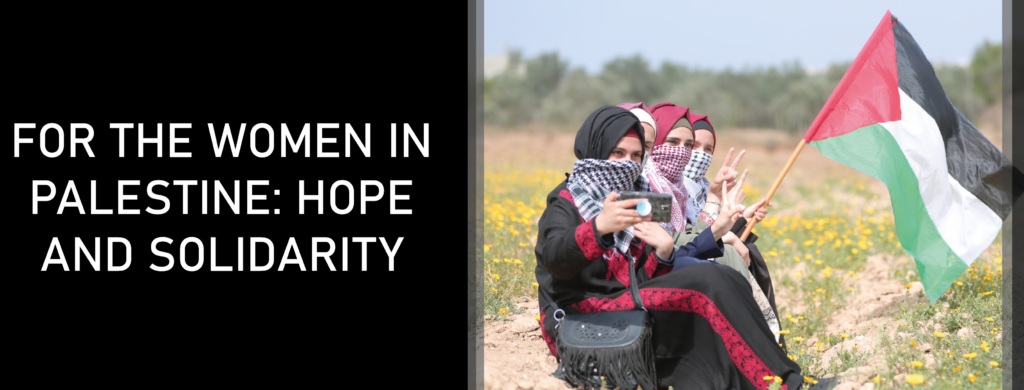In this heartfelt article, the author takes a departure from mainstream discussions on women’s empowerment and equality to shine a light on the often-overlooked struggles of Palestinian women amidst the Israel-Palestine conflict.

Dear Readers,
On this day, as we celebrate International Women’s Day, I have decided to leave behind the mainstream topics like women empowerment and equality. Ever since I started my career in the news industry, I have been consuming news with each meal I have had. My conversation with my family, friends and colleagues generally revolves around news. Consequently, once you’ve created a habit of staying updated, you will most likely finish your day with a news article. Despite my efforts of unwinding from my work life during my days off, I am still reminded of the events happening around the globe from the newsletters I have subscribed to. Since October 7, 2023, I have been reading about the Israel-Palestine conflict on an hourly, if not, daily basis. Sensitive issues like this tend to occupy our minds, especially the negative ones. This can be explained by the term “Negative Bias”. Negative bias is how our minds make us pay more attention to the negative events happening around us. This also explains why we generally tend to discuss distressing news in conversations rather than positive or neutral news.
We often advise highly sensitive people, “Be informed, not immersed.” But this can be of little or no help when a voice in the back of our heads constantly remind us that we are witnessing a humanitarian crisis, genocide and ethnic cleansing taking place in front our eyes while we enjoy our tranquility. I am not writing this editorial to declare my political stance, neither am I writing it with the intention to preach about history. This article is a sincere response to my conscience, urging me to address and discuss this matter. My purpose is to shed light on the human aspect as my article resonates on a personal and empathetic level, emphasizing the need of understanding and compassion. In the magazine articles I have written, I have focused a lot on financial inclusion of women, women in leadership and so on. But this article is dedicated to the women in Palestine whose desolation cannot be justified with words.
According to the UN Women’s report, more than 9000 women have been killed by Israeli forces, more than 3000 women have become widows after losing their companions. The report further states that 37 mothers are being killed on a daily basis, while 155,000 women are expecting or breastfeeding, among whom 5500 are expected to deliver next month. All of this, paired with poverty, leaves us with a question: Will Palestine ever recover from this loss? Is loss even the right word to phrase what they are going through?
Let’s leave the statistics and sentiments behind. Before we admire the strength and determination of Palestinian women, it is imperative we become aware of the degrading and inhumane circumstances they are going through. The killings of Palestinian women along with their family members highlight the profound cost of this situation. The assault doesn’t end here. Palestinian women are being denied menstrual pads, food and medication. As you read this, the women in Palestine are being subjected to unimaginable forms of sexual assaults and severe beatings. When we read about children being taken away from their mothers, the least reasoned question we can ask is, “Haven’t they lost enough already?” But there are hundreds of level headed questions we haven’t been answered with, neither have we dared to ask out loud. Questions that have existed even before the attack on October 7. Who is going to question everything that Western colonialism led to in between the 1920s and 1940s? Who is going to ask about Al Nakba? And the war in 1967 when Israel occupied East Jerusalem, when countless Palestinians were displaced from their homes?
After all that has happened, it is easy for us, as outsiders, to sit in our homes that have no threats of being bombed, to show sympathy for Palestinian women for enduring these sufferings. Today, as Palestinian mothers give birth to their children in rubble, let us not forget the resilience of Palestinian women during the First Intifada. If anything, the children who will survive this conflict will certainly build a stronger Palestine tomorrow. And it is our responsibility, not as diplomats, not as politicians and not as ambassadors, but as humans, to ensure that Palestine rises again as a stronger nation, proud of their faith and culture. We can ensure this as global citizens by supporting organizations that are providing humanitarian aid in Palestine, advocating for international intervention to address human rights violations and encouraging open dialogues that foster understanding between conflicting parties. Acknowledging the resilience of Palestinian women is not enough, we need to move beyond sympathy and focus on coming up with tangible solutions that can promote peace and justice in the region.
The powerful role of Palestinian women from the First Intifada and the sacrifice of the Palestinian women in this conflict should be memorialized in our memory. This International Women’s Day, we must all look for ways we can advocate for the life of Palestinian women and their nation’s future. To take a political stand can cost us a lot, but being a human is a cause for us to stand in solidarity for those being stepped on by unjustified hatred and violence. As a human, you and I do not need to look for a cause in order to do everything in our power to bring this humanitarian crisis, this genocide and this ethnic cleansing to an end.
Warm regards,
Suraksha Subba
Editor-in-Chief

